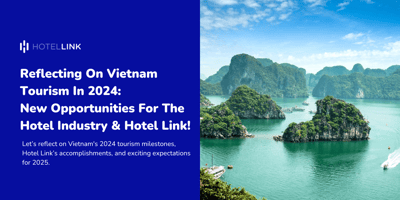Vietnam's tourism market has been undergoing positive changes with promising new trends. In 2024,...
How Can Sustainable Tourism in Vietnam Avoid Being Seen as Greenwashing?
In recent years, the concept of “sustainable tourism” has gained increasing attention in tourism and hospitality development strategies. However, amid the media buzz, many brands have simply jumped on the trend, leading to greenwashing - painting a “green” image superficially without creating real value for the environment or communities.
So how can Vietnam’s hospitality industry implement sustainability in a deep, meaningful, and effective way - without falling into the trap of superficial “green” claims? This article will help you better understand the issue and offer practical, actionable directions - based on global trends, domestic policies, and a tech-driven perspective from Hotel Link.
What Is Sustainable Tourism?

Sustainable tourism refers to tourism development that minimizes negative impacts on the environment, society, and local culture, while ensuring long-term benefits for both local communities and travelers.
Unlike short-term marketing campaigns, sustainable tourism demands long-term commitment, transparency, and collaboration throughout the entire tourism supply chain - including hotels, restaurants, tour operators, and local governments.
Greenwashing: When “Green” Is Just a Cover
Greenwashing is the act of falsely promoting or exaggerating the environmental friendliness of a product, service, or business. In the hotel industry, this might include:
-
Claiming to be “green” but still using single-use plastic
-
Displaying eco slogans without changing internal operations
-
Placing a few fake plants and calling it an “eco-hotel”
This not only erodes customer trust but also damages the broader reputation of the tourism industry. It’s especially dangerous as travelers become increasingly aware and critical of sustainability claims.
Consumers Are Increasingly Concerned About Sustainable Travel
According to Booking.com’s 2024 and 2025 Sustainable Travel Reports, sustainable travel is no longer a passing trend - it’s a top priority for Vietnamese travelers:
-
96% of Vietnamese travelers say sustainable travel is important to them
-
80% want to leave a positive impact on destinations they visit
-
56% feel guilty when choosing unsustainable travel options
-
43% believe they can personally make a positive impact on local communities
These are not just statistics - they are a clear wake-up call for the tourism and hospitality sector:
Sustainable travel is no longer optional - it’s a real consumer demand.
Hanoi: A Pioneer in Reducing Single-Use Plastic in Vietnam
In July 2024, the Hanoi People’s Council issued Resolution 22/2025/NQ-HĐND on reducing plastic waste, including:
-
Starting in 2026, hotels, resorts, and accommodation providers will no longer be allowed to offer single-use plastic items such as toothbrushes, combs, razors, and mini shampoo bottles.
-
Businesses are encouraged to switch to eco-friendly alternatives like wood, paper, sugarcane pulp, or bamboo.
-
Hotels must educate guests on the reason behind these changes and encourage them to bring their own toiletries.
This is a bold and systematic step, laying a strong foundation for Vietnam’s hotel industry to shift toward sustainable operations.
Global Inspiration: From “Free Amenities” to “Bring Your Own”
Reducing plastic waste in hospitality is no longer a trend - it has become standard practice in many countries. Miniature toiletries like toothbrushes, shampoos, and razors are disappearing - not to cut costs, but to meet environmental goals and align with changing consumer behaviors.
✔︎ In many cases, countries have implemented thoughtful communication strategies to help guests understand these changes - not just abruptly removing items:
-
New York (USA): From 2025, hotels with more than 50 rooms will be banned from providing toiletry bottles under 12oz (~350ml). Chains like Marriott and Hilton have switched to large refillable dispensers, reducing millions of plastic bottles annually.
-
California implemented a similar ban in 2023. Major groups like IHG, Hilton, and Accor have adopted refill stations and removed mini amenities from guest rooms.
✔︎ A notable example:
-
A mid-size hotel chain shifted from spending $683,000/year and disposing of 2.8 million plastic bottles to installing wall-mounted refill systems. This saved over $500,000 per property annually and eliminated more than 7 million plastic items per year.
✔︎ In the hospitality industry:
-
IHG (InterContinental Hotels Group) eliminated mini toiletry bottles across 5,000+ hotels starting in 2021.
-
Marriott estimates a reduction of over 500 million plastic bottles annually thanks to this initiative.
✔︎ Boutique hotels across Asia and Europe are also taking action:
-
In Japan, many hotels no longer provide disposable plastic toothbrushes or razors due to environmental regulations. Guests can purchase eco-friendly amenities at the front desk if needed.
-
At OCÉANO Health Spa Hotel (Spain), each guest receives a reusable glass bottle, with refill stations located throughout the resort - completely eliminating PET bottles.
How Are Vietnamese Hotels Starting Their Sustainability Journey?
-
Policy development: Eliminate free amenities like mini shampoos or plastic toothbrushes; use refillable dispensers or encourage guests to bring their own as part of responsible travel.
-
Staff training: Front desk and housekeeping staff should be able to clearly explain changes - “we’re reducing plastic to protect the environment” - to gain guest support rather than cause inconvenience.
-
Transparency: If a hotel can report how many plastic bottles have been saved, how much money has been saved, or how many guests brought their own toiletries - these numbers should be shared to build authentic trust.
How to Avoid Greenwashing – Core Principles
-
Be transparent and measurable: Don’t just say “we’re going green” - provide real data: how much water saved, how much plastic reduced.
-
Deep, honest storytelling: Share real stories - what changes were made, what challenges you faced, how guests responded - rather than posting generic green imagery.
-
Staff education: Change means nothing if your team doesn’t understand or can’t convey the sustainability message to guests.
-
Choose tech partners for long-term impact: Technology helps hotels operate more efficiently, reduce waste, and create eco-friendly guest experiences.
Read more: Why Sustainable Practices Are a Strategic Imperative for Hospitality Industry?
Conclusion: Real Action, Not Just Hype
To promote sustainable tourism in Vietnam, we need more than slogans. It’s a continuous journey that requires collaboration between businesses, policymakers, and the travel community.
Hotels can start small - reducing plastic, being transparent, choosing the right tech - but must do so with depth, strategy, and responsibility.
Don’t follow half-hearted green trends just to “stay relevant.” Today’s travelers are smart - and they know what’s genuine.
Are you considering a shift to a more sustainable hotel model?
Let the Hotel Link team help you find the right technology solutions - flexible, cost-effective, and impactful - to save resources, enhance guest experience, and support Vietnam’s journey toward greener tourism.
Contact us today to build a more sustainable future for hospitality.



